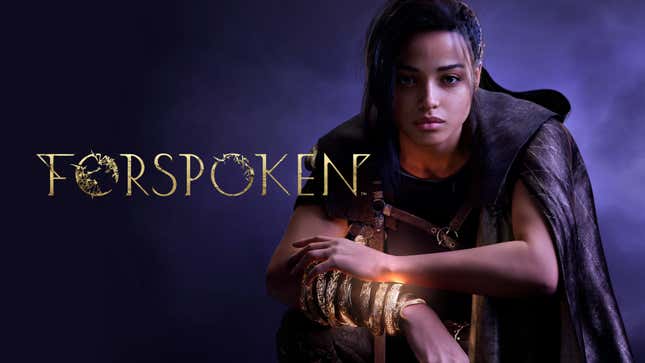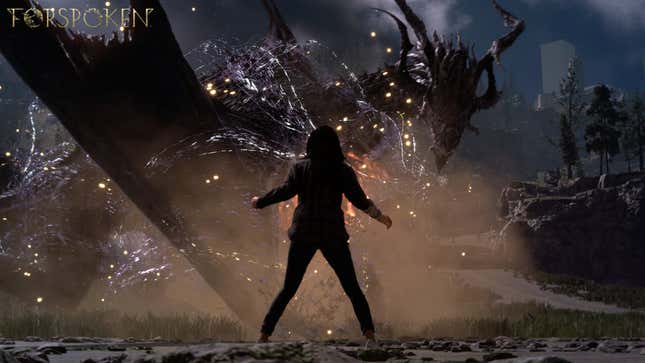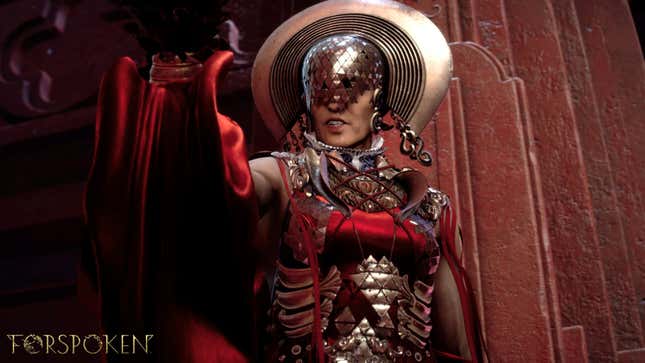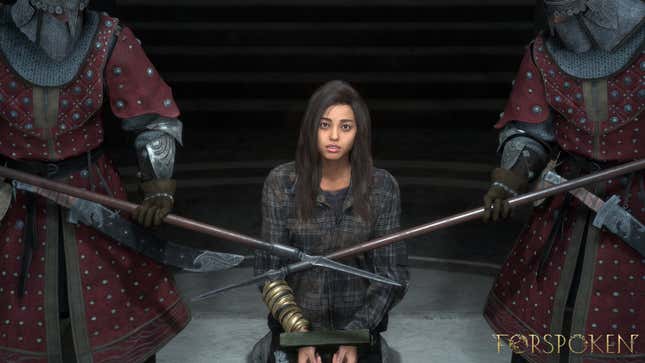
Update, 12/14/2021 12:30 p.m. ET: The “hip hoppy walk” comment was mistakenly attributed to a writer, and not motion-capture and voice over director Tom Keegan, who actually made the comments. We have also updated the attribution of the journalist question in the piece.
When I was scheduled for a preview of Forspoken, formerly Project Athia, there were three questions I was pressed to know. One, how the team went about handling the portrayal of its Black protagonist. Two, what the gameplay was like, and three, how Forspoken stands out among other fantasy action role playing games. While Square Enix’s hour-long preview provided a serviceable, if not clinical, job in addressing some of those questions, my initial curiosity has turned into trepidation.
Read More: Square Enix PS5 Showcase Forspoken Is Starting To Look Like A Real Game
Forspoken is a game by former Final Fantasy XV devs Luminous Productions which follows New Yorker Frey Holland as she’s isekai’d into the “beautiful” and “cruel” fantasy world of Athia. The world that awaits her is overrun by a blight called The Break, which turns animals and humans alike into monstrous creatures. To make matters worse, The Tantas, a matriarchy who once served as Athia’s benevolent leaders, have turned into evil witches. Luckily for Frey, she’s been imbued with magical powers that make her immune to The Break thanks to her fashionable talking jewelry companion, Cuff. To find her way back home, Frey must use her newfound powers and defeat the Break and the Tantas.
While I didn’t get to play Forspoken during my preview, I was able to watch early build footage of the game during a pre-recorded stream. The preview showcased Forspoken’s magic system, parkour, and combat in action. It also gave me an opportunity to hear about Frey’s development from the game’s lead writers.

The magic in Forspoken runs on an enhancement system Square Enix calls the Nail system, which you can think of as something similar to what would happen if a mage enchanted or upgraded an everyday item. The Nail system leans heavily on Ancient Egyptian and Babylonian historical influences, where the act of painting one’s nails displays one’s status and power.
“We wanted to represent the ability enhancements in a form that’s part of Athian history as well as merging with something that’s relatable to our modern world. The theme of duality is central to Forspoken, and so as players explore the game they’ll come to learn that the Nails are heavily embedded in Athian lore and culture, however Frey also views them through a modern lens (much like we would),” Square Enix said.
The Break works similarly to how fade rifts work in Dragon Age Inquisition, with waves of enemies bursting through that must be dealt with. Luminous Productions’ Final Fantasy XV origins come into play with Forspoken’s freeform combat, which includes frenetic enemies and flashing red numbers that pop up when you deal massive damage to those enemies.
Another key component of Forspoken’s gameplay that sets it apart from other fantasy games is its magic parkour system, which was best showcased in its Game Awards trailer. In the trailer, Frey can be seen traversing mountains at break-neck speeds as well as fashioning herself a floating skateboard to cross a river.
Although the early gameplay footage I saw in the hands-off preview looked rougher than the feats on display in The Game Awards trailer, Square assured that the game would look better and “feel amazing” upon launch.

While Forspoken didn’t appear to be reinventing the wheel when it came to its magic open world, the leading actress, Ella Balinska, still stood out to me. Square Enix said its decision was obvious given its desire to have a “strong, female lead” as its protagonist.
“We wanted our hero and other characters in Forspoken to be reflective of our diverse audiences and relatable to our players,” Square Enix said. “We decided to model Frey after casting actress Ella Balinska, as we felt she embodied our envisioning of Frey perfectly.”
While “meeting” the lead writers behind Forspoken was meant to curb any fears I had with how its protagonist was going to be handled, it ended up sparking more unease than I initially had about the game.
At one point in the pre-recorded “get to know the writers” section, I learned that Forspoken has been in development since 2018, with Telltale Games’ The Walking Dead writer Gary Whitta, and Uncharted’s head writer and creative director Amy Hennig laying down the groundwork for the game’s world concept and narrative while it was in pre-production. The torch was then passed to the game’s lead writers Allison Rymer and Todd Stashwick, who finalized the story and script for the game. While all these high profile names were all well and good, especially for their previous association in crafting other “AAA” games, last I checked none of them were Black people. Question marks rapidly started to fire off in my head about the game’s handling of Frey which were only festered by how its writers went about describing working with Balinska.
My newfound fears weren’t helped when Rymer and Stashwick described Frey’s origin story, which came off as a tired amalgamation of Black stereotypes. Those stereotypes included her “being very angry,” her having “fallen through cracks of society,” and being “on the verge of prison,” before being teleported to Athia. The cherry on top of my newfound dread was motion capture and voice over director Tom Keegan describing Balinska’s mannerisms during her motion capture performance as having a “very hip-hoppy kind of walk.”
I wasn’t the only journalist to find Keegan’s awkward remark and the lack of Black writers shown in our preview as harrowing. When Axios’ Stephen Totilo asked if there were any Black developers or consultants involved with Forspoken in Square Enix’s video chat, he didn’t receive an answer during our preview. (Later on, he received an FAQ sheet that rounded up our media questions. Sadly, its answer came off as a canned response that leaned heavily on the hands-off preview where Balinska’s “passionate” feedback throughout her motion capture process was regarded as “invaluable feedback” for the team.
“We worked closely with a number of consultants from BIPOC backgrounds to help portray Frey’s character and tell the story from her perspective,” Square Enix said in the FAQ, adding that Forspoken’s supporting cast was “dominated by women and several women of color.”
While I don’t doubt that Luminous Productions consulted Black folks in how they went about creating Frey, being greeted by white writers, and only hearing about consultation from second-hand account didn’t do them any favors for me as a player who’s been starving for Black representation in games, both on-screen and in crafting their narratives. When we have discussions about representation and changing the way games are made, it feels like they are often left at superficial changes, like the face on the game cover or a nearly interchangeable protagonist. Sure, they have Black actors like Balinska and Janina Gavankar as antagonist Tanta Sila, but without Black writers or consultants featured prominently during the preview, the game didn’t come off well for me. The wince-inducing descriptions levied at the protagonist could have easily been avoided had anyone with melanin been given meaningful positions of power on the project.

Another concern I had going into the preview was how often Frey and Cuff would quip at each other during gameplay, which was a Marvel movie amount from both its initial trailer, The Game Awards trailer, and my hands-off look. These quips would include swearing during the banter between Frey and Cuff during combat encounters. In response to this concern, Square Enix said the intention for the banter was to showcase Frey’s complexity as a “complex, imperfect, and raw character” while making her more relatable as a self-insert for players to the bonkers setting she now found herself in.
“When Frey is in a battle, we really wanted to show her vulnerable side and the fear she is experiencing when she finds herself in situations out of her own control but also how she toughens up in order to survive. We also carefully considered, ‘How would we respond ourselves, through a modern lens, if we were thrown into this fantasy setting with all of its magical creatures and mysterious powers?’”
For those put off by Frey and Cuff’s banter, Square Enix is apparently “still in the process of adjusting the exact frequency, content and volume of their banter.”
Overall, I’m not too pressed by Frey’s quips so much as I’m worried about how she’s going to be represented in the game as a Black character who’s only had white writers. Hopefully my apprehension is like a friend giving a bad summary of a film, and the actual game holds up better than a preview or a developer description would.
Forspoken comes out on PC and PlayStation 5 on May 24, 2022.